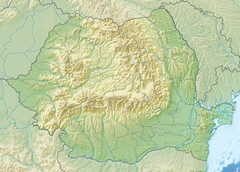The Dâmbovnic is a right tributary of the river Neajlov in Romania.[1][2] It discharges into the Neajlov in Obedeni.[3] Its length is 110 km (68 mi) and its basin size is 639 km2 (247 sq mi).[2][4]
| Dâmbovnic | |
|---|---|
 | |
| Location | |
| Country | Romania |
| Counties | Argeș, Dâmbovița, Teleorman, Giurgiu |
| Physical characteristics | |
| Mouth | Neajlov |
• location | Vadu Lat |
• coordinates | 44°20′33″N 25°40′10″E / 44.3426°N 25.6694°E |
| Length | 110 km (68 mi) |
| Basin size | 639 km2 (247 sq mi) |
| Basin features | |
| Progression | Neajlov→ Argeș→ Danube→ Black Sea |
| Tributaries | |
| • left | Mozacu, Jirnov |
| • right | Rața, Gligan, Berivoaia, Negrișoara |
Geography
editThe river flows through four different counties: Argeș, Dâmbovița, Teleorman and Giurgiu. It flows from North-West to South-East and forms near the high plains of Pitești, where it receives residual water from Arpechim. Then, it passes through the Găvanu-Burdea Plain and finally ends into the Neajlov River, near Clejani. It is a permanent river. It flows through the villages Bradu, Suseni, Pădureni, Gălășești, Rociu, Bârlogu, Negrași, Mozăceni, Slobozia, Șelaru, Vătași, Drăghinești, Gratia, Cartojani, Sadina, Roata de Jos, Mârșa and Uiești.
Protected areas
editAt the confluence with the river Mozacu, is a small reservation, Negrași Daffodil Meadow.
Human impact on the river
editThe only part of the valley that is not affected by human activities is the upper part, above the Dâmbovnic Lake. At this part, the river can dry up in summer.
The only lake is the Dâmbovnic Lake, situated at the place where the residual water from Arpechim flows into the river through a 5.8 km long canal. The lake is very important and is used as a cleaning station for the toxic wastes. Work is done in order to remove the toxic sediments in the lake and to improve the natural and artificial filters. Downstream, the river is drained.
Pollution
editIn the past, the water was very polluted.[5] This affects the river itself, underground water and local villages. The main source of pollution was the Arpechim Refinery, which was closed in 2011.[6] Record fines were given in 2007.[7] However, there are other sources of pollution, like petrol, when oil pipes are broken by thieves.[8] In the lower part of the valley, pollution may accidentally come from local villagers who wash their cars and animals in the river or take construction materials from the riverbed.[9]
However, recent studies[9] show that the ecosystems are not endangered. Fish exist again and there are many plants near and in the water.
The underground water is severely polluted.[10] As a result, water from local fountains is not drinkable. Especially in the villages that are upstream, people drink water from local public sources. In Rociu, water is pumped from 150 to 200 meters deep.[11]
References
edit- ^ "Planul național de management. Sinteza planurilor de management la nivel de bazine/spații hidrografice, anexa 7.1" (PDF, 5.1 MB). Administrația Națională Apele Române. 2010. p. 770.
- ^ a b Atlasul cadastrului apelor din România. Partea 1 (in Romanian). Bucharest: Ministerul Mediului. 1992. p. 333. OCLC 895459847. River code: X.1.23.8
- ^ Dambovnic (jud. Arges), e-calauza.ro
- ^ Pișota, Ioan; Cocoș, Octavian (2003). "Unele observații hidrologice referitoare la bazinul râului Neajlov". Comunicări de Geografie, București. VII: 185.
- ^ "Causes and effects of natural environment degradation in the hydrographic basin of river Neajlov" (PDF). Archived from the original (PDF) on 2012-03-28.
- ^ Petrom took the decision to permanently close the Arpechim refinery, OMV Petrom, 25 March 2011.
- ^ "Amenzi record pentru poluarea râului Dâmbovnic | REALITATEA .NET". Archived from the original on 2012-07-25. Retrieved 2011-07-26.
- ^ "Poluare cu petrol in Arges, din cauza unor hoti".
- ^ a b "Studiul florei spontane de pe albia râului Dâmbovnic, dezvoltată sub influenţa apelor reziduale epurate de s. N. P. Petrom Bucureşti – sucursala Arpechim Piteşti (aprilie – septembrie 2003)" (PDF) (in Romanian). Archived from the original (PDF) on 29 September 2020.
- ^ "The Neajlov Catchment (Romania)" (PDF). Archived from the original (PDF) on 2012-03-28.
- ^ "Alimentare cu apa in satele serbanesti, gliganu de sus,- Licitatie Publica".
